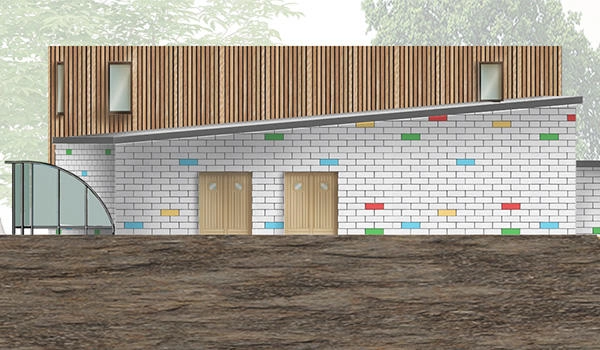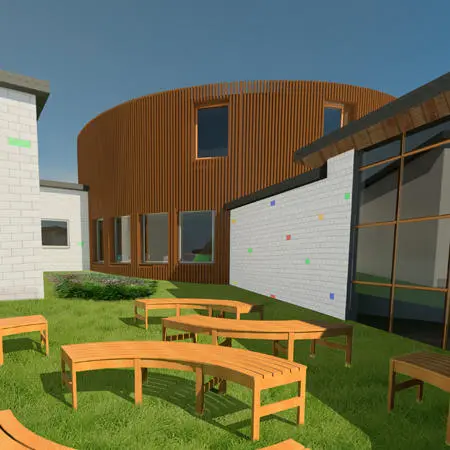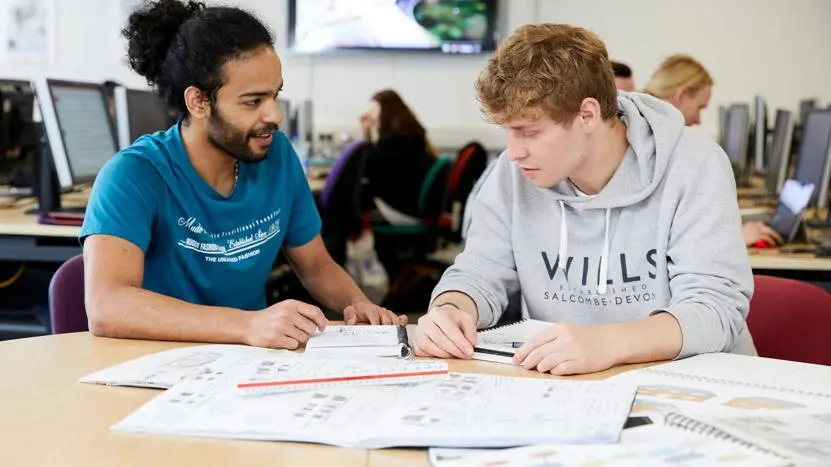
“It allows you to look at the buildability and functionality of a building you’re designing”


Build on your existing experience to earn an internationally recognised higher education qualification and be better prepared to take on more advanced roles in the architectural technology sector.
Highly regarded by local employers, this regularly revised Higher Nationals programme helps students to develop a sound understanding of the design and detailing required to complete major construction projects. Students also learn fundamental design principles, health and safety requirements and critical thinking skills.
The industry-focused curriculum encourages students to develop practical skills. Our professional facilities include construction-specific laboratories, computer-aided design (CAD) stations, Revit, Adobe Creative Suite, Google SketchUp Pro, 3D printers and large format printers and scanners. By using these resources, Solent students can develop the specific skills required by the architectural technology industry – as well as a range of transferable skills that are applicable in other industries.
Students also have the opportunity to work in our architectural design studio. This modern space is developed to mirror the atmosphere of a working professional studio, bringing students together from various building design courses to collaborate on multidisciplinary projects just as they would in the workplace.
Contact international admissions
Email: Call:This course has access to specialist facilities
You can apply direct to Solent University for this course
After successfully completing your studies, there's an opportunity to continue your studies at Solent
You can study this course part-time
This course is aimed at those already in the construction industry, and who wish to study part-time while they work. The course is ideal for those in junior architectural roles who wish to broaden their knowledge of architectural design and technology to advance their career into more senior positions.
As a part-time student you’re expected to already be employed within the construction industry. The programme has a strong commitment and excellent reputation for the career development of its students both during and post-studies.
This HNC provides students with a platform to progress onto a number of full degrees including BA (Hons) Architectural Design and Technology (part-time).


Hear from Solent alumni about where their careers have taken them and how studying at Solent prepared them for their future.
Read more stories
“It allows you to look at the buildability and functionality of a building you’re designing”

The course team have extensive industry experience, holding memberships at the Chartered Institute of Architectural Technologists, Chartered Institute of Builders (CIOB), the Institution of Civil Engineers (ICE), the Association of Building Engineers (ABE), the Royal Institute of Chartered Surveyors (RICS) and the Royal Institute of British Architects (RIBA). The team also have a strong network of industry contacts, which has given past students access to guest speakers, live briefs and site visits.
The University cannot guarantee any particular members of staff will teach specific aspects of the course in the future, but will endeavour to ensure the teaching team maintains their balance of experience and qualifications.
The dedicated studio is based on the kind of environment that students will experience in the workplace. It is fully equipped with the latest in computer-aided design tools and equipment including Mac and PC CAD stations, Revit, Vector Works, Adobe Photoshop, Adobe Illustrator, Google SketchUp Pro, plotters, large format scanners and digital cameras. Most importantly, it is an area where students and tutors can work together on projects in a professional but relaxed and friendly environment.
Our vibrant campus brings state-of-the-art facilities to enhance your learning and elevate your student experience. Our award-winning teaching building, The Spark is centred around students and offers a stimulating study environment with flexible learning spaces. Away from studying, why not try out the gyms, fitness studios and sports halls in our £28 million Sports Complex, or watch a blockbuster film at our student-run cinema with Dolby Atmos audio.
This module introduces you to the principles of construction technology focusing on low-rise, predominantly domestic-scale buildings.
This module plays an important role in your learning it exposes you to the scientific principles of materials used in architecture, engineering and construction.
This module will enable you to learn standard architectural graphic conventions and techniques, developing the freehand and technical detailing skills which are at the core of the architectural profession.
Solent’s curriculum framework builds on our unique, creative and applied approach to teaching. The transformation of students’ lives is at the heart of our mission as a university, and our curriculum – informed by the latest theory – reflects this shared educational vision.
Find out more
The student achievement team are on hand to help you succeed during your studies at Solent. They aim to contact you at key times during your time here with personalised information, advice and guidance, by email or phone.
The disability advice team provides information, advice and guidance for disabled students.
All students can access Succeed@Solent, Solent's online guide to getting better grades. It offers extensive, practical information and advice on topics such as academic writing, research and presentations.
From the London skyline to Southampton’s own major development projects, you only need to look around to see that architecture in the UK is ever-evolving.
Innovative buildings such as the Shard and the Gherkin, projects such as the Battersea Power Station development, and plans for the tallest residential building in the UK at South Quay Plaza reveal a flourishing industry – and an ever-increasing need for talented graduates with the right blend of technical skills and architectural vision.

Graduate starting salary: £20,000 to £25,000
With a few years' experience at mid-level seniority, salaries fall between £24,000 and £45,000, rising to £60,000 at senior level.
Starting salary: £20,000 to £35,000
Salaries vary, depending on the sector. Experienced project managers could earn between £40,000 and £80,000, depending on the sector.
The stated salaries are published on prospects.ac.uk. Income figures are intended as a guide only.


Hear from Solent alumni about where their careers have taken them and how studying at Solent prepared them for their future.
Read more stories
“It allows you to look at the buildability and functionality of a building you’re designing”

The Solent Careers team is committed to getting students into great careers.
While you are studying, the team can help you with finding work experience or placements, link you with a mentor, check your CV, or offer one-to-one guidance.
If you're in your final year, we also have graduate job opportunities just for Solent graduates.

6th
UK uni for sustained employment
Longitudinal Educational Outcomes, 2022
Every student at Solent University will also have the option to study an additional Certificate in Practical Artificial Intelligence qualification alongside their course. Free of charge, the course ensures you'll be prepared for a fantastic and varied career after graduation.

The tuition fees for the 2025/26 academic year are:
For further information, please visit our tuition fees page.
While most course costs are covered by your tuition fees, some essential resources and optional extras may need to be paid for separately. These additional costs are listed below. For advice on budgeting and managing your money, please contact student.funding@solent.ac.uk.
The 2025/26 other costs are not yet available. For guidance, the 2024/25 other costs were:
Compulsory costs
Solent University offers a range of bursaries and scholarships that provide financial assistance or waive fees for tuition or accommodation. Each bursary or scholarship has specific eligibility criteria. Check out our bursaries and scholarships pages to find out more.
Cost of living support
At Solent, we understand that the cost of living crisis may be of some concern. To help, we've put together some detailed information to show what support is available and how to make your money go further.
There is no charge to attend graduation, but you will be required to pay for the rental of your academic gown (approximately £45 per graduate, depending on your award). You may also wish to purchase official photography packages, which range in price from £15 to £200+. Graduation is not compulsory, so if you prefer to have your award sent to you, there is no cost. Extra guest tickets will go on sale after results publication and will be sold on a first-come-first-served basis. The cost per ticket is currently £15. Please note, we do not guarantee there will be any extra tickets available to purchase.
Please select an option below:
For further information about UK, EU and international qualifications, please see our course entry requirements document.
Students from outside the EU are usually unable to obtain a visa for part-time study. Please visit our visas and immigration page for more information.
For further information about UK, EU and international qualifications, please see our course entry requirements document.
Contact international admissions
Email: Call:Applications for part-time courses are made directly to the University and can be made at any time prior to the start of the course. If you have any questions about applying for this course, please contact the admissions office by emailing admissions@solent.ac.uk.
Applications are welcomed from students who do not have the academic qualifications listed above but may be admitted on the basis of relevant experience rather than standard qualifications.
Important note about progression routes:
Progression to a Pearson Higher National Diploma (HND) qualification is not automatically available after completion of this Higher National Certificate (HNC) course.
Solent’s HNC is awarded under a Trademark Licence and the final award from this course, although mapped closely to Pearson’s programmes, is not a Pearson BTEC Higher National award.
Candidates wishing to progress onto a course at another provider may need to complete additional modules or check with the provider if acceptance to the progression course will be available with the HNC award. Many providers offer recognition of prior learning, but this will be on a case by case basis.
Students graduating from Solent do have progression routes at Solent University to degrees or to other professional qualifications.
Applicants who do not have English as their first language will be required to demonstrate an approved level of proficiency in the use of the English language. The agreed minimum requirements for this course are:
Qualifications are checked before enrolment, and international students must bring their original certificates or certified copies when coming to study at the University.
Pre-Sessional English programme
The University also offers a pre-sessional English programme for international students who wish to improve their level of English before starting a degree course.


